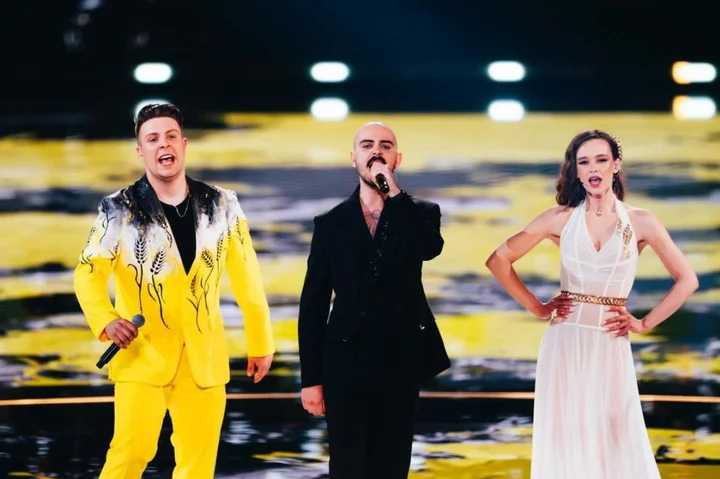
Ukrainian rapper took fury over war to Eurovision after brother killed
The tragic reality of Russia’s bloody war on Ukraine took centre stage in a rather unusual setting recently – the Eurovision song contest. The embattled nation was supposed to host the event but due to the ongoing and deadly conflict, it was relocated to Liverpool. Ukrainian performers not only attended the ever-popular show but made sure to use the opportunity to spread their message to the huge TV audience. Among them was Kyiv rapper Otoy, who lost his own brother on the frontline. The 24-year-old, whose real name is Vyacheslav Drofa, performed at Eurovision alongside other Ukrainian musicians, bringing awareness of the atrocities of the invasion to millions. He described the “adrenaline and emotion” coursing through his body as he took to the stage earlier this month, telling The Independent: “I have never felt such a level of solidarity and support for the Ukrainian people as I did in Liverpool. “That level of understanding and emotion at Eurovision – it was crazy. Everybody was with you and your country. It felt like, ‘We support you because you are going through hell’.” Otoy is no stranger to that hell, having received tragic news in March that a body discovered in Ukraine was his brother, who had gone missing the previous April while defending besieged Mariupol. “I don’t even know what I felt,” said Otoy. “When you’re hoping for a year that he’s alive and can’t find anything, then realise his body is in Kyiv and you should identify it. “In fact, this isn’t even a body – it’s a head, a bit of a leg, part of a hand, little bits of bones. We could only identify him through his teeth. It feels really bad, the worst emotions I had in my life actually.” The rapper’s music reflects his fury and he accuses Russia of trying to “destroy” Ukraine and its culture. “I feel a lot of anger inside of me because of the things the Russians are doing,” he said. “They already crossed all the red lines, there’s no way back, we should fight till the end. “If we stop now then give it 10 years and they’ll come back with a bigger army and then they’ll invade Poland, which is a member of Nato. We’re fighting a worldwide evil. “The reason we’re doing it is we are really tired of that Russian b******t – trying to destroy Ukraine, our culture, our musicians.” Not only has the 24-year-old tackled the war through his music, he volunteered on the frontline last summer by salvaging the bodies of dead soldiers and bringing them back to their families. He is also fundraising to provide military supplies to Ukrainian soldiers for the country’s planned counteroffensive. His day job is in IT, working as a UX director at a company that created RSFY, a mobile tracker of Russian army losses. The company also developed the app TacticMedAid, which provides medical instructions for people if they input their symptoms after getting injured. Otoy juggles all of these roles during Moscow’s frequent attacks on the Ukrainian capital. “It feels like a surreal dream I live in,” he said. “Every time when there’s some air or rocket attacks, or shelling, it feels like this type of nightmare. I think, give me a couple of minutes, then everything will be OK – but I never wake up because that has continued for more than a year.” He is hopeful the war will come to an end his year but says the road to recovery after that will not be easy. “It will be a hard time – receiving bodies back, lots of funerals, lots of rebuilding cities, people returning to their houses and realising there’s no home because it will have been destroyed,” he said. “After the war, I don’t know what people will do with their emotions, I’m really scared of this.” Otoy said he will continue to make music and apps when the conflict is over, and had nothing but praise for his countrymen and women as they continue to fight against Putin’s forces. “The only thing that helps me feel alive and some kind of emotions is the process of making music and to know that millions of Ukrainians will use the IT applications I work on,” he said. “Those are two things I’ll be doing until the end of my days. “I’m feeling proud about Ukrainians. People are staying in their country, for their homeland, until the end, until their last breath.” Read More Ukraine-Russia war – live: Don’t turn a blind eye to Putin’s invasion, Zelensky warns Arab leaders Britain says Russia will ‘pay the price’ for Ukraine invasion as fresh wave of sanctions unveiled Ukraine's president begins visit to Saudi Arabia, aims to enhance ties with Arab world The Body in the Woods | An Independent TV Original Documentary The harrowing discovery at centre of The Independent’s new documentary
2023-05-28 15:27
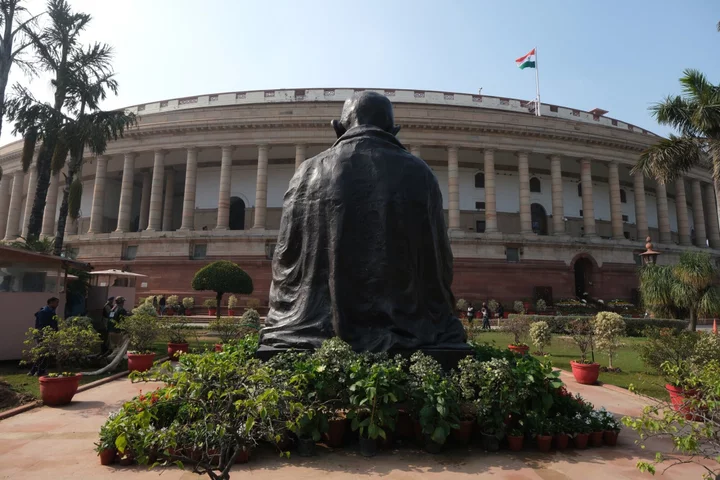
Modi Unveils New Parliament, Reshaping India’s Power Center
India’s corridors of power are getting a makeover — part of Prime Minister Narendra Modi’s efforts to cement
2023-05-28 12:47
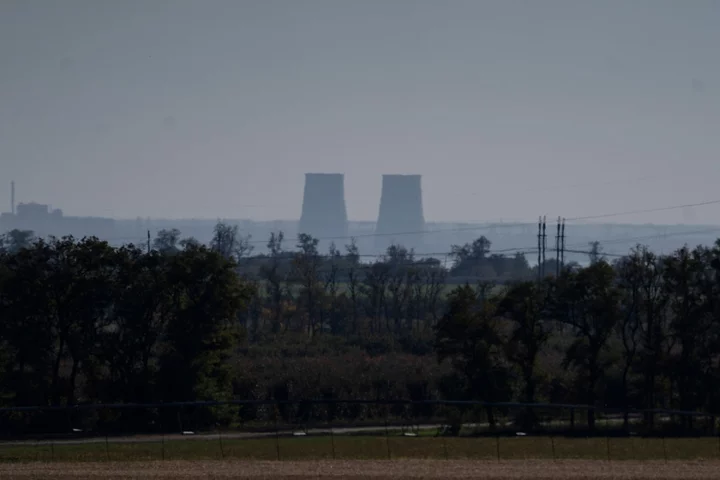
Putin ‘planning provocation’ at nuclear plant to disrupt Ukraine counteroffensive, Kyiv says
Russia is plotting a “large-scale provocation” at a nuclear power station it occupies in the south-east of Ukraine to disrupt an imminent counteroffensive, Kyiv’s military intelligence has claimed. A statement from the intelligence directorate of Ukraine’s defence ministry claimed Russian forces will strike the Zaporizhzhia nuclear power plant, the biggest in Europe. It will then report a radioactive leak in order to trigger an international probe that would pause the hostilities and give them the respite they need to regroup. In order to make that happen, Russia “disrupted the rotation of personnel of the permanent monitoring mission” of the UN’s International Atomic Energy Agency (IAEA) that was scheduled for Saturday, the statement said. It did not offer evidence to back up any of the claims. The IAEA said it did not have any immediate comment on the allegations and Russian officials did not immediately comment on the Ukrainian claims. The White House said it is watching the situation closely and has seen no indication radioactive material has been leaked. It comes as Moscow’s military in Ukraine braces for a looming counteroffensive by Kyiv’s forces, which has not started yet but could begin “tomorrow, the day after tomorrow or in a week”, the secretary of Ukraine’s National Security and Defence Council, Oleksiy Danilov, told the BBC. He said the government in Kyiv had “no right to make a mistake” on the decision because this is a “historic opportunity” that “we cannot lose”. The Zaporizhzhia station is one of the 10 biggest nuclear plants in the world. It is in the partially occupied Zaporizhzhia region in south-eastern Ukraine. The plant’s six reactors have been shut down for months but it still needs power and qualified staff to operate crucial cooling systems and other safety features. Fighting near it repeatedly disrupted power supplies and has fuelled fears of a potential catastrophe like the one at Chernobyl, in northern Ukraine, where a reactor exploded in 1986 and spewed deadly radiation, contaminating a vast area. In other developments on Saturday, Russia reported more attacks on its territory, with drones crashing in its western regions and areas on the border with Ukraine coming under shelling. Two drones attacked an administrative building of an oil company in Russia’s western Pskov region that borders Belarus, Latvia and Estonia, Pskov governor Mikhail Vedernikov reported on Saturday. The building was damaged as the result of an explosion, Mr Vedernikov said. Another drone went down in the Tver region about 90 miles north of Moscow, local authorities said. Russia’s Belgorod region on the border with Ukraine came under multiple rounds of shelling on Saturday, killing one person, according to its governor Vyacheslav Gladkov. In the neighbouring Kursk region, which also borders Ukraine, one person was killed by cross-border mortar fire, its governor Roman Starovoit said. And a 60-year-old man was killed by Russian shelling in the city of Kupyansk in the Kharkiv region, about 20 miles from the Russian border, Ukraine’s national police said. Meanwhile, Russia’s ambassador to the UK Andrei Kelin warned his country was yet to “act very seriously” in the conflict. Mr Kelin told the BBC that Moscow had “enormous resources” and the country was “16 times bigger than Ukraine.” He said: “Sooner or later, of course, this escalation may get a new dimension which we do not need and we do not want. We can make peace tomorrow.” In addition, the British military said on Saturday that Russia’s private military force, Wagner, is withdrawing from areas around the eastern city of Bakhmut that Moscow claims to have captured earlier this month. Wagner chief Yevgeny Prigozhin earlier this week announced the pullout, saying Wagner would hand control over the ruined city over to the Russian military. Some were sceptical, however. Mr Prigozhin is known for making unverifiable, headline-grabbing statements on which he later backtracks. But Britain’s Ministry of Defence (MoD) said in a series of tweets on Saturday that Wagner fighters “have likely started to withdraw from some of their positions” around Bakhmut. “The Ukrainian deputy defence minister also corroborated the rotation out of Wagner forces in the outskirts of the town,” it added. Additional reporting by agencies Read More Ukraine-Russia war – latest: Putin ‘plans nuclear radioactive leak to postpone counteroffensive’ Ukraine claims Russia is plotting 'a provocation' at nuclear plant, offers no evidence Vladimir Putin’s Ukraine facade is crumbling – this week proves it The Body in the Woods | An Independent TV Original Documentary The harrowing discovery at centre of The Independent’s new documentary
2023-05-28 06:18

US Jobs Report Is Set to Provide Some Solace to the Fed
US employers are gradually dialing back the pace of hiring and hourly earnings are moderating, offering some solace
2023-05-28 04:22

Colombia Needs New Oil Drilling, Former Finance Chief Says
Colombia needs new oil exploration after a drop in the nation’s proven reserves as the government seeks to
2023-05-28 03:16
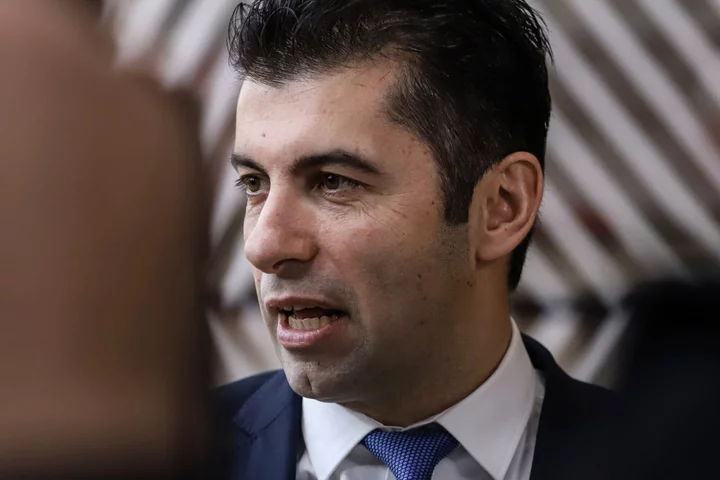
Bulgarian Government Deal Hits the Rocks Over Leaked Wiretaps
Bulgaria’s long-awaited coalition deal may face collapse, prolonging a years-long political crisis, as the Balkan country’s biggest party
2023-05-27 23:48
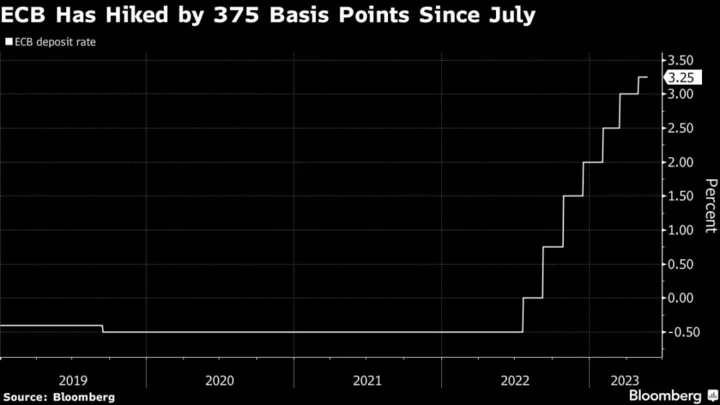
ECB Near ‘Top of Ladder’ on Rate Tightening, Makhlouf Says
The European Central Bank is in the final stretch of its historic cycle of interest-rate increases, according to
2023-05-27 22:20
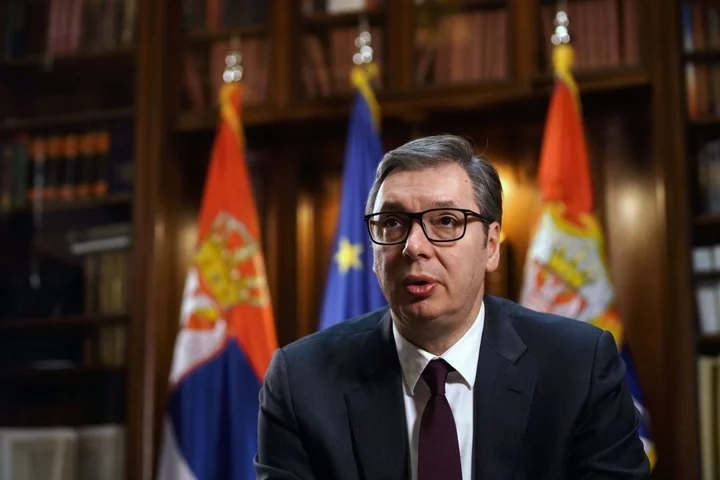
Serb President Steps Down as Party Leader Amid Swelling Protests
Serbian President Aleksandar Vucic stepped down as the head of his political party in a concession seen as
2023-05-27 22:19
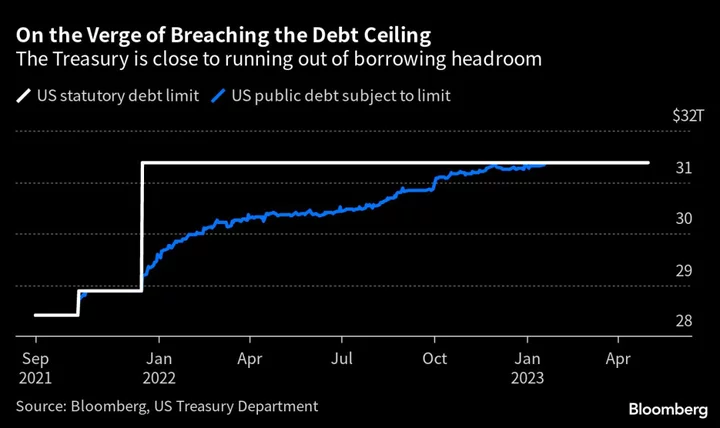
Charting the Global Economy: German Growth Outlook Deteriorates
Germany suffered its first recession since the start of pandemic, extinguishing hopes that Europe’s top economy could escape
2023-05-27 17:19
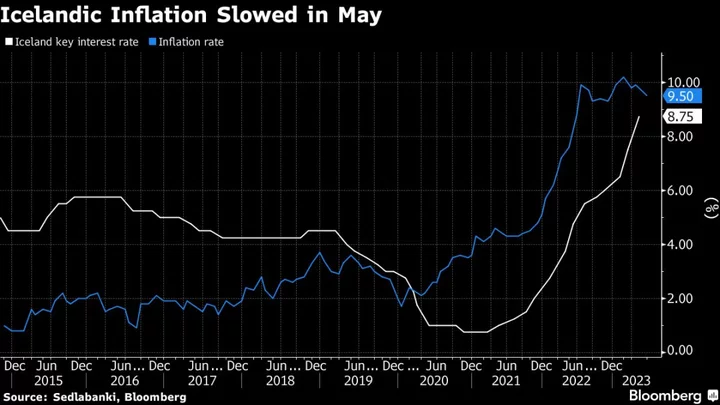
Iceland Wage Restraint Needed to Slow Hikes, Central Banker Says
Iceland’s labor market parties must rein in wage growth to help slow interest rate hikes, according to the
2023-05-27 17:17
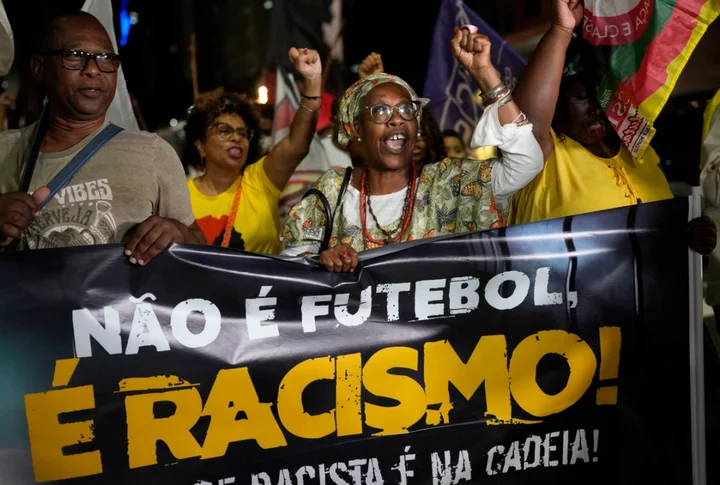
Disgusted by racism targeting soccer's Vinícius, his Brazilian hometown rallies to defend him
The chants of “monkey!” at the Spanish soccer stadium echoed across the Atlantic, reaching the ears of people on the outskirts of Rio de Janeiro. That's where Vinícius Júnior, who is Black, grew up and launched his soccer career. Now, despite his global fame and millions, he was again the target of crude European racism. His city in multiracial Brazil was sickened, and has rallied to his defense. In Sao Goncalo, rapper Deivisson Oliveira was eating breakfast when the TV news showed the abuse aimed at his hometown hero. “I needed to cry out," said Oliveira, 30, who raps under the name MC Menor do CPX. Oliveira typed lyrics on his phone with his 6-month-old son at his feet. Powerful verses surged through his thumbs: "From the favela to the world: Strength, Vinícius Júnior!" Racism in the Spanish league has intensified this season, especially after Vinícius started celebrating goals by dancing. On at least nine occasions, people have made monkey sounds at Vinícius, chanted the slur “monkey!” and hurled other racist slurs. Vinícius has repeatedly demanded action from Spanish soccer authorities. Vinícius’ 2017 move to Real Madrid was the culmination of years of effort. One of the most popular clubs in global soccer paid 45 million euros (about $50 million) — at the time the most ever for a Brazilian teenager — even before his professional debut with Rio-based Flamengo. Relentless racism wasn’t part of Vinícius’ dream when he was growing up in Sao Goncalo. Sao Goncalo is the second-most populous city in Rio’s metropolitan region, and one of the poorest in the state of Rio de Janeiro, according to the national statistics institute. At night in some areas, motorists turn on their hazard lights to signal to drug-trafficking gangs that the driver is local. It is also where the 2020 police killing of a 14-year-old sparked Black Lives Matter protests across Rio. Racism has once again fanned outrage. Rio’s imposing, illuminated Christ the Redeemer statue was made dark one night in solidarity. The city’s enormous bayside Ferris wheel this week exhibits a clenched Black fist and the scrolling words: “EVERYONE AGAINST RACISM.” “My total repudiation of the episode of racism suffered by our ace and the pride of all of us in Sao Goncalo,” the city's mayor, Nelson Ruas dos Santos, wrote on Twitter the morning after the incident. Rio's Mayor Eduardo Paes was less diplomatic when responding to a defense issued by the Spanish soccer league’s president. “Go to hell, son of a...” Paes wrote. On Thursday, Spanish league president Javier Tebas held a news conference claiming that the league has been acting alone against racism, and that it could end it in six months if granted more power by the government. At the same time in Rio, representatives of more than 150 activist groups and nonprofits delivered a letter to Spain’s consulate, demanding an investigation into the league and its president. They organized a protest that evening. “Vinicius has been a warrior, he’s being a warrior, for enduring this since he arrived in Spain and always taking a stand," activist Valda Neves said. “This time, he’s not alone.” The first Black Brazilian players to sign for European clubs in the 1960s met some racism in the largely white society, but rarely spoke out. At the time when Brazil still considered itself a “racial democracy,” and did not take on the racism that many faced. In the late 1980s, the federal government made racial discrimination a crime and created a foundation to promote Afro-Brazilian culture. At the time, many Brazilian players who might identify as Black today did not recognize themselves as such. Incidents of racism in Europe prompted little blowback in Brazil. In the decades since, Brazil’s Black activists have gained prominence and promoted awareness of structural racism. The federal government instituted policies aimed at addressing it, including affirmative-action admissions for public universities and jobs. There has been heightened consciousness throughout society. In 2014, a fan hurled a banana at defender Dani Alves during a Spanish league match; he picked it up and ate it in a show of defiance, triggering a coordinated social media campaign with other Brazilian players, including star forward Neymar, who did the same. Vinícius’ own educational nonprofit this week launched a program to train public school teachers to raise awareness about racism and instruct kids in fighting discrimination. A teacher at a Sao Goncalo school that will host the project, Mariana Alves, hopes it will provide kids much-needed support and preparation. She spoke in a classroom with soccer-ball beanbag chairs strewn about, and enormous photos of Vinícius on the walls. Most of the school’s students are Black or biracial, and many have experienced racism, Alves said in an interview. This week, her 10-year-old students have been asking if she saw what happened to Vinícius because they don’t fully understand. “He has money, he has all this status, and not even that stopped him from going through this situation of racism,” said Alves, who is Black and from Sao Goncalo. “So the students wonder ... ‘Will I go through that, too? Is that going to happen to me?’” As a boy, Vinícius started training at a nearby feeder school for Flamengo, Brazil's most popular club, before signing with its youth team. Sao Goncalo kids there were a blur Wednesday afternoon as they ran non-stop drills, leaving them without time or breath to discuss their idol’s troubles on another continent. Still, they knew. One of them, Ryan Gonçalves Negri, said he has talked about it with his friends outside the soccer school, and that Vinícius should transfer out of the Spanish league “urgently.” “I would never want to play there," Negri, 13, said. “It's not for Brazilians who know how to score goals and celebrate.” While the kids practiced, the rapper Oliveira and his producer Éverton Ramos, known as DJ Cabide, stepped onto the turf and made their way to the corner. They set up a speaker beneath a banner of Vinícius as a brash teenager with his tongue extended, then started recording a clip for their protest song’s music video. “I’m no one, but my voice can reach where I can’t go, where I can’t imagine going,” Oliveira said. “My voice will get there, you understand?” ___ Associated Press writer Mauricio Savarese contributed from Sao Paulo ___ More AP soccer: https://apnews.com/hub/soccer and https://twitter.com/AP_Sports Read More Ukraine war’s heaviest fight rages in east - follow live Charity boss speaks out over ‘traumatic’ encounter with royal aide Spanish court opens investigation into racist abuse targeting Vinícius Júnior Spain takes action against racism after Vinícius case but punishing fans remains a challenge Roma striker Tammy Abraham on racism in soccer: 'These things hurt people'
2023-05-27 16:48
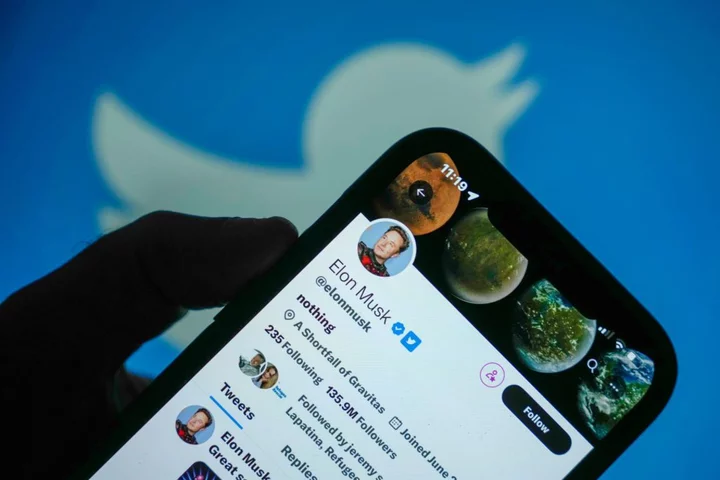
Twitter Withdraws From EU Disinformation Code, Commissioner Says
Twitter exited the voluntary European Union’s Code of Practice on Disinformation, the bloc’s Internal Market Commissioner Thierry Breton
2023-05-27 15:52
